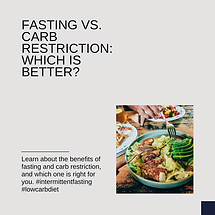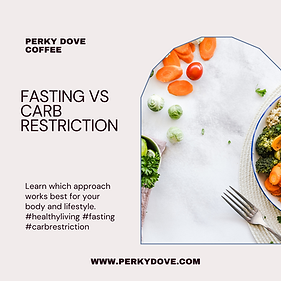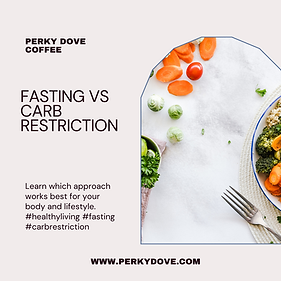We use affiliate links. If you purchase something using one of these links, we may receive compensation or commission.

In the world of dieting and weight loss, two popular strategies have emerged as frontrunners: fasting and carb restriction. Both methods offer unique benefits and have gained widespread attention for their potential to promote weight loss, improve metabolic health, and enhance overall well-being. But how do they stack up against each other, and which approach is best suited to different scenarios? Join us as we explore the differences between fasting and carb restriction and help you determine the right approach for your health and fitness goals.
Understanding Fasting: Fasting involves voluntarily abstaining from food for a specified period, ranging from several hours to several days. Popular fasting methods include intermittent fasting, where you cycle between periods of eating and fasting, and extended fasting, which typically lasts 24 hours or longer. Fasting is believed to promote weight loss by reducing calorie intake, improving insulin sensitivity, and promoting the body’s natural fat-burning processes. Additionally, fasting has been associated with various health benefits, including improved cardiovascular health, enhanced cognitive function, and increased longevity.
Exploring Carb Restriction: Carb restriction, on the other hand, involves reducing the intake of carbohydrates, particularly refined carbs and sugars. This approach is commonly followed in low-carb diets such as the ketogenic diet (keto), where carbs are limited to induce a state of ketosis, where the body burns fat for fuel instead of carbohydrates. By restricting carbs, the keto diet aims to stabilize blood sugar levels, reduce cravings, and promote weight loss. Additionally, carb restriction has been linked to improvements in metabolic health markers such as blood pressure, cholesterol levels, and triglycerides.

Choosing the Right Approach: So, which approach is better for achieving your health and fitness goals? The answer depends on various factors, including your lifestyle, preferences, and specific health needs. Here’s a breakdown of when each approach may be most beneficial:
- Fasting may be ideal if you’re looking for a flexible and convenient way to reduce calorie intake, improve insulin sensitivity, and promote fat loss. Intermittent fasting, in particular, can be easily integrated into your daily routine and may offer metabolic benefits even without significant changes in diet composition.
- Carb restriction, such as the ketogenic diet, may be preferred if you’re seeking rapid weight loss, improved metabolic health markers, and enhanced mental clarity and focus. The keto diet has been shown to be effective for weight loss and may be particularly beneficial for individuals with insulin resistance, metabolic syndrome, or neurological conditions such as epilepsy.
When it comes to weight loss, the debate between intermittent fasting and carb restriction has been a hot topic. Let’s delve into the details:
- Intermittent Fasting (IF):
- Definition: Intermittent fasting involves restricting food intake to specific time windows. It can include fasting for several hours or even days.
- Popularity: IF has gained traction due to its perceived ease of maintenance compared to other diets.
- Effects: Studies show that IF may help reduce weight, blood pressure, insulin sensitivity, and cholesterol.
- Weight Loss Comparison: However, recent research suggests that IF is no better than calorie restriction for weight loss. In fact, it is less effective in reducing body fat content.
- Optimization: Including physical activity as part of an intermittent fasting diet could enhance weight loss1.
- Carb Restriction:
- Definition: Carb restriction involves limiting carbohydrate intake, ensuring lower blood sugar and insulin levels.
- Comparison: A study comparing fasting and low-carb approaches in type-2 diabetics found that zero-carb nutrition has significant impacts. However, fasting can be even more consequential2.
- Blood Sugar Levels:
- Findings: Intermittent fasting with an earlier eating window is more effective at reducing blood sugar levels than other diets, including calorie restriction3.
In summary, both approaches have their merits, but there’s no clear winner. The key lies in finding what works best for your individual needs and lifestyle. Remember, sustainable habits and overall health matter most! 🌟
- Intermittent fasting, which involves alternating between periods of fasting and eating, has associations with weight loss and other health benefits.
- A recent review synthesized results from clinical trials examining the impact of four common intermittent fasting schedules on weight loss and other health benefits.
- The study found that all four intermittent fasting schedules had associations with weight loss and a beneficial impact on blood pressure, insulin sensitivity, and blood glucose and cholesterol levels.
- The review found that modified alternate-day fasting or the 5:2 diet, involving restricted calorie intake on fasting days, were especially effective in facilitating weight loss and improving cardiometabolic outcomes.
Intermittent fasting is an eating pattern that involves alternating periods of fasting and eating. In other words, it restricts food intake to specific times.
There are multiple different approaches to intermittent fasting. Certain schedules only allow food intake during 8 hours of the day, whereas others restrict or reduce food intake to certain days of the week.
Multiple randomized clinical trialsTrusted Source have shown that intermittent fasting can help reduce weight and improve metabolic and cardiovascular health.
Furthermore, researchers have conducted meta-analyses to summarize the findings of these clinical trials on the health benefits of the various forms of intermittent fasting. These meta-analyses have generally focused on the association between specific intermittent fasting methods and health outcomes.
Intermittent fasting schedules can vary considerably. Commonly followed intermittent fasting regimens include alternate-day fasting, the 5:2 diet, and time-restricted eating.
There are two forms of alternate-day fasting: zero-calorie alternate-day fasting and modified alternate-day fasting.
Zero-calorie alternate-day fasting involves fasting on alternate days, with no calorie intake on these fasting days. In contrast, modified alternate-day fasting allows limited calorie intake on the fasting days.
The 5:2 diet involves fasting for 24 hours once or twice a week, whereas time-restricted eating involves fasting for at least 12 hours during the day.
Some of this blog post is credited to Medical News Today
Conclusion: In the debate between fasting and carb restriction, there is no one-size-fits-all answer. Both approaches offer unique benefits and can be effective tools for achieving weight loss and improving overall health. Ultimately, the best approach is the one that aligns with your individual goals, preferences, and lifestyle. Whether you choose to embrace fasting, carb restriction, or a combination of both, remember to prioritize nutrient-dense foods, stay hydrated, and listen to your body’s hunger and satiety cues. With consistency, mindfulness, and a balanced approach, you can achieve lasting success on your health and fitness journey.






